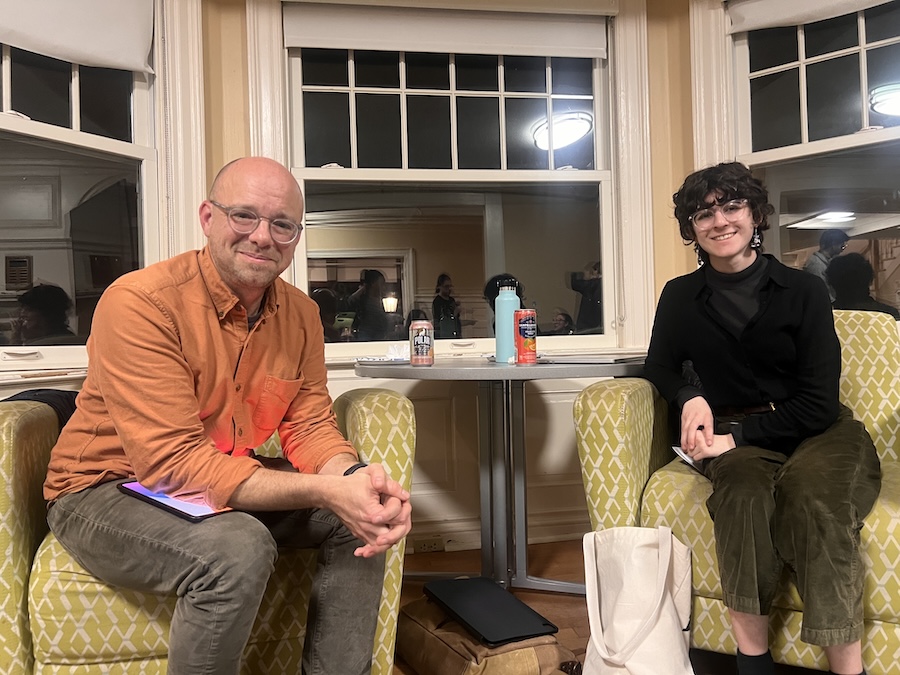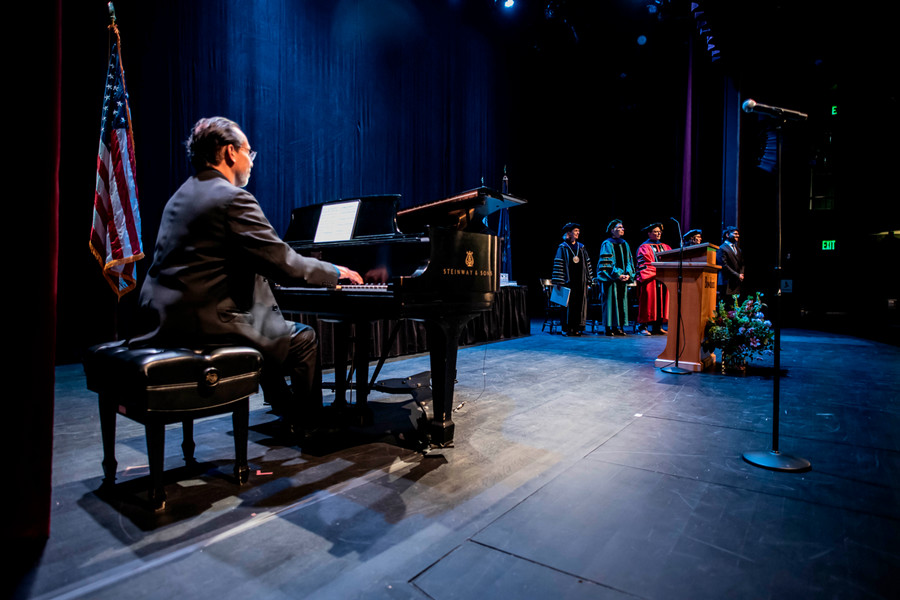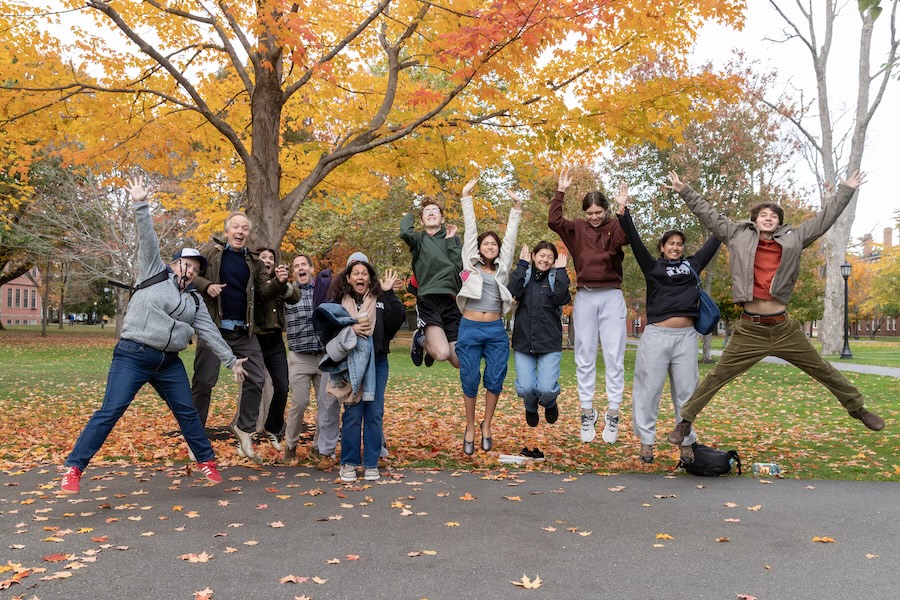"Voices from Bowdoin's Past," Dean of Student Affairs Timothy Foster
By Tom PorterBowdoin’s campus is intimate and contained, but in the beginning, it was just plain tiny.
Back then, in the early decades of the nineteenth century, the entire campus was just a small corner of the quad we know and enjoy today—a rectangle with Mass Hall on the northern edge, Winthrop and Maine on the east, and a small wooden chapel out in front of Maine, its front door facing Mass Hall.
Back then, students could roll out of bed in Maine and Winthrop and be in Mass Hall for meals and classes in less than a minute.
And worrying what to wear didn’t slow them down!
———-
Now, many students have lived in Winthrop and Maine over the years—including some of you—but in all of this history, only one student’s presence has been memorialized with a plaque.
Standing with your back to the door of Adams Hall and looking up toward Winthrop you can make out a rectangle of white marble just below a third floor window on the northeast corner of the building.
Step closer and you can read the inscription: “College Room of Longfellow 1823-1825”
————
Henry Longfellow was one of the first students to occupy New College, as it was called then.
He lived in room #37 with his brother, Stephen, during his junior and senior years.
Living in Winthrop was a very new and exciting experience for young Henry, and I do mean young.
You see, Henry was already a published poet when he began his studies at Bowdoin—at the age of 14!
During his freshmen year, he lived at home in Portland. For his sophomore year, he lived with his brother at the Titcomb House on Federal Street which we know today as the recently renovated Stowe House.
So it was only when he was a junior, that Henry experienced true campus living for the first time. In September, he wrote to his parents:
“…I feel very well contented and much pleased with College life. Many of the students are very agreeable companions and, thus far, I have passed my time very pleasantly.
The students have considerably more leisure time than I expected, but as the season advances and the days grow shorter, our leisure moments must necessarily be considerably diminished.”
Henry was excited—about simply being a student at Bowdoin and living on campus.
In October of his junior year, Henry wrote to his brother:
“…I feel far better contented here – far more happy, and far less inclined to be low-spirited, than has ever been the case at any former period…
You must not be surprised when I tell you, I wish to not come home. No—not yet!—not for weeks—months!”
Well, guess what parents? Many of them will be coming home. Tomorrow!!!
As Longfellow approached the midway point of his senior year at Bowdoin, he was beginning to feel the pressure every college student before and since has known.
Yes, Class of 2018, this is a constant—the pressure associated with questions about what—comes—next.
Parents and family, be gentle. It turned out quite well for Henry and it will work out for your daughter or son as well.
Henry had a pretty good idea about what he wanted to do after college. But, probably, like some of you, he wasn’t so sure that it was going to fly at home.
Even in 1825, and even with a talent as immense as his, one had to negotiate with parents about future plans.
“My dear father,” he wrote
…I take this early opportunity to write to you, because I wish to know fully your inclination with regard to the profession I am to pursue, when I leave college.
For my part, I have already hinted to you what would best please me.
The fact is, – and I will not disguise it in the least, … I most eagerly aspire after future eminence in literature, my whole soul burns most ardently for it, and every earthly thought centers in it.”
The response from home was – well… not exactly what Henry wanted to hear.
Imagine that Class of 2018!!!
But he persisted, writing again…
“My dear father,
…from the general tenor of your last letter, it seems to be your fixed desire, that I should choose the profession of the Law for the business of my life.
I believe that I have already mentioned to you that I did not wish to enter immediately upon any profession.
…You must acknowledge the propriety and usefulness of aiming high – at something which it is impossible to overshoot – perhaps to reach…
I have a most voracious appetite for knowledge. To its acquisition I will sacrifice anything.”
This year, America and Bowdoin celebrated the 211th anniversary of the birth of Henry Wadsworth Longfellow.
Looking back on his life, and especially at his accomplishments at such an early age, it might seem that his success was preordained.
But as he sat where you sit, even with all that success, even with all that confidence, nothing was certain.
Longfellow wrote to his sister Ann:
…In five weeks we shall be set free from college…Then comes Commencement—and then—and then—I cannot say what will be after that.
Henry Longfellow, who would go on to be arguably the most popular literary figure in 19th century America, was at his Commencement clearly already a gifted writer able to convey detail in vivid ways.
————–
Tomorrow, as you pack your rooms, say your goodbyes and linger just a bit longer, reflect on the following words that Henry penned in a letter to his father during his junior year.
“The term is about closing, and many of the students, at least, have gone…
Now and then there is a solitary footstep in the entry, a solitary rap at the distant door, the noise of the falling latch, and then, all still again.”
The words of Henry Wadsworth Longfellow, a member of the Bowdoin Class of 1825.
Thank you for listening.



